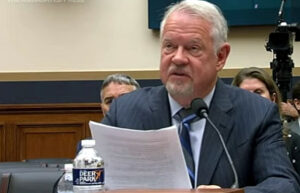by WorldTribune Staff, July 1, 2021
Federal law enforcement agencies regularly press to covertly probe the private data of Microsoft customers, a leading executive at the Big Tech goliath told a congressional committee on Wednesday.
“The recent revelations that the Justice Department secretly targeted journalists and Members of Congress, their staff, and even their families with secret legal demands for their sensitive personal data were shocking to many Americans,” Tom Burt, corporate vice president for customer security and trust at Microsoft, testified at a House Judiciary Committee hearing.

“But what may be most shocking is just how routine court-mandated secrecy has become when law enforcement targets Americans’ emails, text messages, and other sensitive data stored in the cloud.”
“I want to be clear: The overuse and abuse of secrecy orders is not new, and in fact it has remained an ongoing problem since the ascendancy of cloud computing. It is not unique to one administration or political party,” Burt continued.
“And it is certainly not limited to investigations targeting the media and Congress. Secrecy orders under 18 U.S.C. § 2705(b) — also known as non-disclosure orders — have unfortunately become commonplace. They are often approved even for routine investigations without any meaningful analysis of either the need for secrecy or the orders’ compliance with fundamental constitutional rights.”
Burt told lawmakers that “federal law enforcement has consistently presented us with 2,400 to 3,500 secrecy orders each year, or 7-10 per day.”
“These are just the demands that Microsoft, just one cloud service provider, received,” he exclaimed. “Multiply those numbers by every technology company that holds or processes data, and you may get a sense of the scope of the government’s overuse of secret surveillance.”
Burt pointed out the alarming threat to the constitutional rights of Americans posed by technological advances that make government surveillance easier:
In recent years, law enforcement has taken advantage of the efficiencies made possible because of the expansion of cloud computing and technology. As users have moved their email, photos and other data to the cloud, they should have the benefit of an increased expectation of privacy for that data as the cloud is much more secure than any internet connected computer in any home, business, or organization.
But for citizens, businesses and organizations throughout America, this expectation of privacy is unknowingly misplaced. Their own government is secretly demanding users’ data, without their knowledge, from cloud service providers, exploiting a subsection of the 35-year-old Electronic Communications Privacy Act to prevent notification of the demand to users by the cloud service providers. By doing so, the government has transformed decades-old criminal investigative techniques into secret surveillance operations— all without rigorous review by courts. This lack of transparency inevitably leads to overuse and abuse, such as the recently revealed subpoenas of data belonging to journalists and legislators.
This ratcheting up of government eyeballing of citizens’ private data has been cloaked in an unusually intense push for secrecy by the agencies involved, Burt testified.
“Traditionally, secrecy was the exception,” he declared. “In recent years, law enforcement has turned that exception on its head, developing a practice of reflexively asking to keep even routine investigations secret. Providers, like Microsoft, regularly receive boilerplate secrecy orders unsupported by any meaningful legal or factual analysis.”
Technological advances regarding the Internet have made Americans exponentially more vulnerable to government surveillance, Burt asserts:
The fact that law enforcement requested, and courts approved, clandestine surveillance of so many Americans represents a sea-change from historical norms. If law enforcement wants to secretly search someone’s physical office, it must meet a heightened burden to obtain a sneak and peak warrant. More specifically, law enforcement has to prove to a judge with specific and articulable facts that a secret warrant is necessary and Congress placed a strict, presumptive 30-day limit on the length of time that secrecy may last. However, if they want to search your virtual office, they just serve a simple warrant on your cloud provider and obtain secrecy through a boilerplate process.
Burt closed by warning of the alarming dangers to freedom that arise when citizens are not even aware that their own government is investigating them:
Government accountability depends on transparency. That concept is central to our democracy. Secrecy should be the rare exception, not the norm. Providing notice to an individual the government targets with a warrant or other demand for information is a critical protection against government overreach. Safeguarding one’s constitutional rights requires knowledge that those rights are at risk. Without notice, an individual is left in the dark, unable to raise privileges or other objections that may be applicable, and unable to protect their rights in court.
“Without legislative reform, abuses will continue to occur — and they will continue to occur out of sight,” Burt ended his testimony by saying.
INFORMATION WORLD WAR: How We Win . . . . Executive Intelligence Brief
